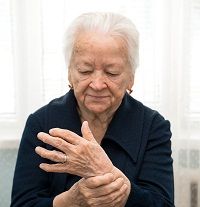Mortality Risk Significantly Climbs for Women with Rheumatoid Arthritis
Women with rheumatoid arthritis (RA) are at a substantially higher risk of mortality – especially those with cardiovascular and respiratory conditions.

Women with rheumatoid arthritis (RA) are at a substantially higher risk of mortality — especially those with cardiovascular and respiratory conditions.
The Nurses’ Health Study provided a huge database of information on patients at various points of disease diagnosis. Corresponding author Jeffrey Sparks, MD, MMSc, and colleagues sifted through the material and found a prominent risk of death in women with RA.
“Previous studies have suggested that RA may be associated with increased mortality, but were not able to control for other variables, such as smoking, that affect both RA and mortality risks,” Sparks, a physician in BWH’s Division of Rheumatology, Immunology and Allergy, said in a news release.
Enrollment in the study began in 1976 and the team evaluated the data from the 119,209 women included in the analysis. None of the participants had connective tissue disease, but a total of 964 women were diagnosed with RA. Over the 36-year follow-up, 28,808 deaths had occurred — 307 of which had RA, and the causes were broken down:
- Cancer: 80 patients (26%)
- Cardiovascular disease: 70 patients (23%)
- Respiratory causes: 44 patients (14%)
Characteristics such as age, smoking, diet, physical activity, and body mass index (BMI) were taken into account and even still, RA remained an independent factor. The significant mortality risk increase was associated with respiratory and cardiovascular conditions, but not cancer — hazard risks of 2.06, 1.45, and 0.93, respectively. There were 95% confidence intervals in the findings, according to the report published in Arthritis Care & Research.
“We finely adjusted for smoking in our analyses so what we’re seeing appears to be due to something else,” Sparks continued. Based on the analysis, that other cause was RA. There was 40% increased risk of death for those specific patients.
Seropositive patients — when blood tests confirm the presence of anti-cyclic citrullinated peptides (anti-CCPs) – have a greater likelihood in developing more severe RA compared to those who test as seronegative. This analysis confirmed a difference between the two types of patients.
“We found that whether participants with RA were seropositive or seronegative really mattered — those who were seropositive were at higher risk, particularly for respiratory mortality,” Sparks clarified. There was a three-fold increased relative risk for seropositive patients compared to those without RA.
Previous research has linked patients with RA with increased risk of cardiovascular death, however, this new analysis puts respiratory symptoms on the radar.
“We hope that this study will encourage patients and clinicians to be more aware that patients with RA are at increased risk of both respiratory and cardiovascular mortality, particularly patients with seropositive RA,” Sparks concluded.